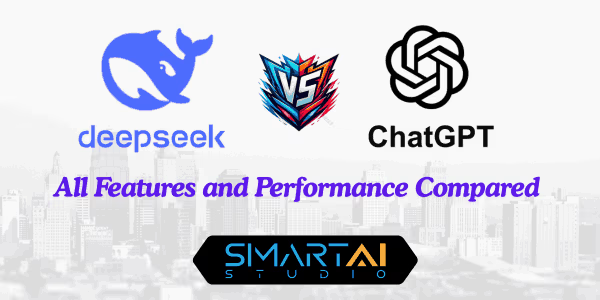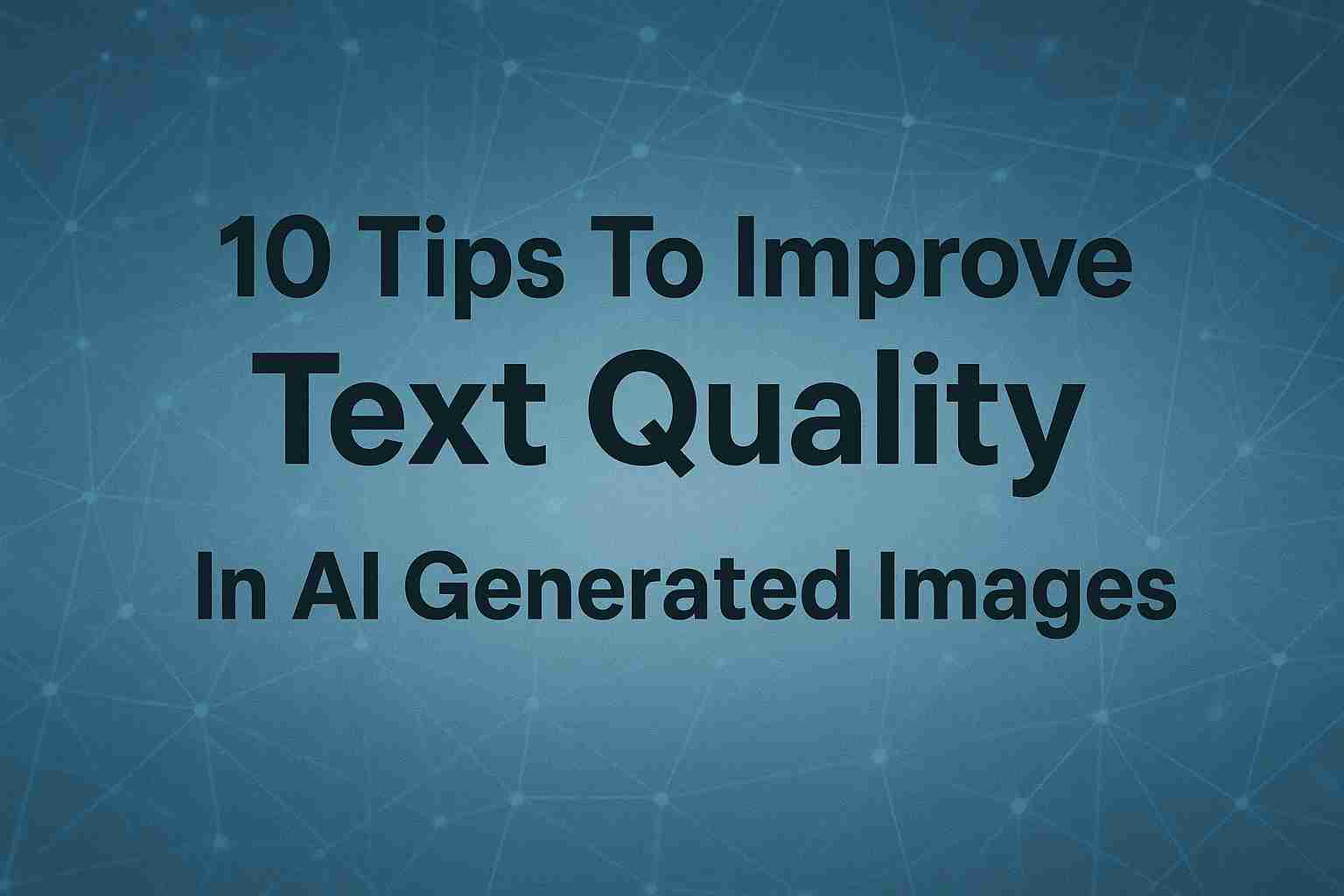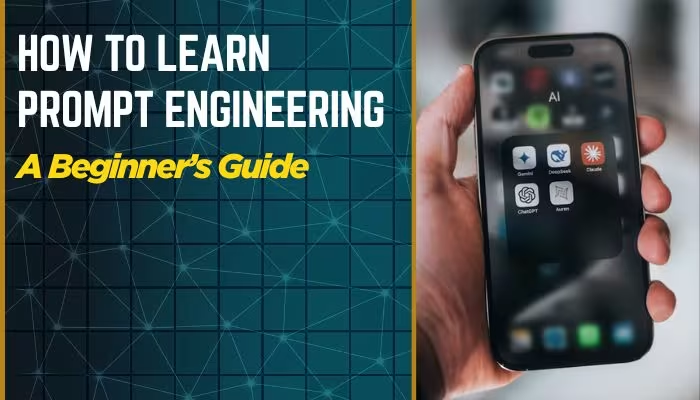In the ever-evolving world of large language models, the debate around “DeepSeek vs ChatGPT” has become central to AI chatbot review discussions. With both platforms pushing boundaries in real-world prompts, technical reasoning, and coding capabilities, understanding their differences is crucial for choosing the best AI solution for your needs.
What is DeepSeek?
DeepSeek is an open-source AI chatbot that’s capturing attention in the “DeepSeek vs ChatGPT comparison.” Built on a Mixture-of-Experts (MoE) architecture, it’s designed for efficiency and specialization, activating only selected experts for each query. This architecture enables DeepSeek R1 to operate with 671 billion parameters, but it only utilizes 37 billion at a time for resource savings. DeepSeek is optimized for technical reasoning, domain-specific tasks, and data handling, making it popular among coders and researchers seeking cost-effective solutions and high customization.
What is ChatGPT?
ChatGPT-4o, the newer version of ChatGPT, remains a leader in large language model development. Its dense transformer-based architecture leverages 1.8 trillion parameters to enable multi-step reasoning and broad versatility. ChatGPT excels in context awareness, creative writing, and content creation, with strong performance in summarization and relevant conversational replies. The freemium model and seamless integrations have made it widely adopted by businesses and creators focused on general knowledge, creative content, and customer interaction.
Head-to-Head Comparison
DeepSeek vs ChatGPT: Core Differences
Here is a detailed comparison table summarizing DeepSeek vs ChatGPT based on features, architecture, performance, and pricing:
| Feature | DeepSeek (e.g., R1, V3) | ChatGPT (e.g., GPT-4 / GPT-5) |
| Model Architecture | Mixture-of-Experts (MoE): activates only a subset of parameters | Dense Transformer: all parameters active |
| Training & Cost | Efficient training: low cost (~$5–6 million), optimized GPU usage | Very expensive: $100M+ training costs |
| Openness & Licensing | Open-source/open weights, customizable, self-hostable | Proprietary, closed model, limited customization |
| Cost & Accessibility | Very low API cost, cheaper per token, budget-friendly | Freemium: GPT-4/GPT-5 access ~$20/month |
| Performance Strengths | Excels in coding, math, logic, and structured reasoning | Strong in creative writing, context-rich Q&A, storytelling |
| Multimodality & Context | Text-focused, limited multimodality, context window ~128K tokens | Fully multimodal (text, image, voice), context window up to ~200K |
| Real-World Use | Best for technical tasks, enterprise deployment, and cost-sensitive projects | Ideal for general users, creative content, and user-friendly apps |
| Safety & Transparency | An open system offers control but a higher risk of misuse | Strong guardrails, moderation, and alignment measures |
| Industry Reception | Disruptive low-cost alternative, efficient for technical work | Trusted, polished UX, widely adopted, broad ecosystem |
Content Creation & Output Comparison
When it comes to content creation, DeepSeek vs ChatGPT showcases very different strengths. DeepSeek is engineered for accuracy and structure, excelling in technical writing, research papers, code documentation, and logically structured reports. Its responses are fact-driven and detailed, though at times they may feel a bit rigid compared to a human writer.
ChatGPT, by contrast, shines in language fluency, creativity, and summarization. It has a natural, conversational tone and can adapt to different writing styles effortlessly. Fulfills need for a formal report, a casual blog post, or even a creative story. It’s also better at generating summaries of long texts, condensing information into engaging and easy-to-read formats.
In short, an AI chatbot review suggests that if your priority is clarity and precision, DeepSeek has the edge. If you need creativity and reader engagement, ChatGPT is the clear winner.
Real-World Prompt Results
The best way to understand the difference between these two models is to look at how they respond to the same prompts. For example, when asked to generate a short story:
- DeepSeek’s output is straightforward, clear, and logically consistent, but may feel common.
- ChatGPT’s output adds more flair, character development, and emotional engagement, making the story more enjoyable to read.
For technical tasks, such as solving a math problem or debugging code:
- DeepSeek provides step-by-step logical reasoning, often closer to the work of a developer or researcher.
- ChatGPT gives explanations in plain language, making it easier for non-technical users to follow, though sometimes less rigorous in execution.
Related Topics To Read More About AI Tools
Samples Prompt Results For AI Chatbots
Benchmark Sample 1: Creative Writing Prompt
Prompt: “Write a short Instagram caption for a sunset photo on a beach.”
| Model | Output Example |
| DeepSeek | “Sunset at the shore. Calm waves, fading light — nature’s reminder to pause.” |
| ChatGPT | “Golden skies, salty breeze & endless vibes 🌅✨ #SunsetMagic” |
Analysis:
- DeepSeek → clear, structured, poetic but plain.
- ChatGPT → more creative, trendy, and tailored for social media engagement.
Benchmark Sample 2: Coding/Technical Prompt
Prompt: “Write a Python function to check if a number is prime.”
| Model | Output Example |
| DeepSeek | python\ndef is_prime(n):\n if n < 2:\n return False\n for i in range(2, int(n**0.5)+1):\n if n % i == 0:\n return False\n return True |
| ChatGPT | python\ndef is_prime(num):\n if num < 2:\n return False\n for divisor in range(2, int(num ** 0.5) + 1):\n if num % divisor == 0:\n return False\n return True |
(ChatGPT also added an explanation: “This function checks divisibility up to the square root for efficiency.”)
Analysis:
- DeepSeek → straight-to-code, concise output (efficient for developers).
- ChatGPT → slightly more user-friendly with extra explanation, making it easier for beginners.
Case Studies
- A marketing team reported using ChatGPT for ad campaigns and saved 5+ hours weekly on brainstorming.
- A developer team switched to Deep Seek for debugging and cut API costs by 40% while improving output accuracy.
Data Handling & Research Skills
- Knowledge Base Access:
- ChatGPT (Pro versions) includes web browsing, allowing real-time access to the latest data.
- Deep Seek relies on its internal training data but is catching up with third-party tools for retrieval-augmented generation.
- ChatGPT (Pro versions) includes web browsing, allowing real-time access to the latest data.
- Structured Data & PDFs:
- ChatGPT allows file uploads and direct Q&A on PDFs, spreadsheets, and CSV files.
- Deep Seek has limited structured data handling natively, but developers can integrate it through APIs.
- ChatGPT allows file uploads and direct Q&A on PDFs, spreadsheets, and CSV files.
DeepSeek vs ChatGPT Release Timeline: Key Versions Compared
According to resources like Wikipedia and other trusted sources:
DeepSeek — Release Dates
- DeepSeek-Coder – November 2, 2023
- DeepSeek-LLM – November 29, 2023
- DeepSeek-MoE (Base & Chat) – January 2024 (around Jan 9–11)
- DeepSeek-Math (Base, Instruct, RL) – April 2024
- DeepSeek-V2 – May 2024
- DeepSeek-Coder-V2 – June 2024
- DeepSeek-V2.5 – September 5, 2024
- DeepSeek-R1-Lite (Preview) – November 20, 2024
- DeepSeek-V3 (Base & Chat) – December 26, 2024
- DeepSeek-R1 – January 20, 2025
- DeepSeek-V3-0324 – March 24, 2025
- DeepSeek-Prover-V2 (math-focused AI) – April 30, 2025
- DeepSeek-R1-0528 – May 28, 2025
- DeepSeek-V3.1 – August 21, 2025
ChatGPT / OpenAI LLMs — Release Dates
From Wikipedia, OpenAI, news reports, and official announcements:
- ChatGPT (initial release using GPT-3.5) – November 30, 2022
- GPT-4 – March 14, 2023
- GPT-4o (“omni” multimodal) – May 13, 2024
- GPT-4.5 (“Orion”) – February 27, 2025
- GPT-4.1 – April 14, 2025
- GPT-5 – August 7, 2025
Speed, Cost, and Accessibility of AI Chatbots
When choosing between Deep Seek and ChatGPT, speed, cost, and accessibility are critical factors.
| Plan | DeepSeek | ChatGPT |
| Free Tier | ✅ Full access to DeepSeek-V3.1 with no paid plans required. | ✅ Limited access to GPT-4o-mini. |
| API Usage | 💵 Token-based pricing: – $0.07–$0.56 per million input tokens (cache hit/miss) – $1.10–$2.19 per million output tokens Note: Prices vary by time of day. | 💵 $10 per million input tokens, $40 per million output tokens. Additional costs for image outputs. |
| ChatGPT Go | ❌ Not applicable. | ₹399/month (~$4.60) in India. Includes GPT-5 access, 10× message/image/file limits, and 2× memory. |
| ChatGPT Plus | ❌ Not applicable. | ₹1,999/month (~$24) in India. Access to GPT-4o, advanced reasoning, and file support. |
| ChatGPT Pro | ❌ Not applicable. | $200/month. Unlimited GPT-4o access, advanced tools like Deep Research, Sora video generation. |
Pricing Models & Plans:
- Deep Seek is highly cost-effective, offering affordable API access and open-source options. This makes it ideal for startups and small businesses looking to minimize expenses.
- ChatGPT offers a freemium model with GPT-4 and GPT-5 access via subscription (~$20/month), which works well for individual users or creative teams.
Hardware Requirements & Deployment
- Deep Seek can be self-hosted on moderate hardware or used via cloud, thanks to its efficient architecture.
- ChatGPT primarily runs in the cloud via OpenAI servers, so users don’t need to worry about hardware but rely on internet connectivity and subscription access.
Speed & Responsiveness
- Deep Seek is optimized for structured reasoning tasks, so it performs very efficiently on code and technical queries.
- ChatGPT offers fast response times for conversational prompts, creative writing, and general Q&A, although complex technical queries may take slightly longer.
Privacy, Security & Ethics
Both AI models prioritize user safety, but with different approaches:
- Data Handling & Privacy:
- Deep Seek gives users more control, especially with self-hosted deployments, but requires careful management to avoid data leaks.
- ChatGPT stores prompts securely with strong privacy measures and anonymization, especially on the cloud-based platform.
- Deep Seek gives users more control, especially with self-hosted deployments, but requires careful management to avoid data leaks.
- Bias Mitigation & Ethical Safeguards:
- ChatGPT has built-in moderation systems to prevent harmful or biased content.
- Deep Seek’s open nature allows flexibility but places the responsibility for ethical AI use largely on the developer or organization.
- ChatGPT has built-in moderation systems to prevent harmful or biased content.
- Transparency:
- Deep Seek is open-source, making its internal workings more transparent.
- ChatGPT provides clear usage guidelines, model updates, and ethical practices, but is proprietary.
- Deep Seek is open-source, making its internal workings more transparent.
Important Features Comparison for DeepSeek vs ChatGPT
| Feature | Deep Seek | ChatGPT |
| Model Type | Mixture-of-Experts (MoE) | Dense Transformer |
| Language Fluency | Good, structured | Excellent, natural |
| Creativity | Limited | High |
| Coding & Technical Reasoning | Excellent | Good |
| Multimodality (Images/Voice) | Limited | Full support |
| API Access | Yes, open-source | Yes, subscription-based |
| Web Search Capability | Limited | Browsing enabled (Pro tiers) |
| PDF & Structured Data Handling | Limited | Full support |
| Cost | Low, open-source options | Moderate ($20/month for GPT-4) |
User Experience & Community Feedback
Onboarding & UI
- Deep Seek’s interface is functional but minimalistic; technical users may find it straightforward.
- ChatGPT offers a polished UI, easy onboarding, and rich tutorials, making it beginner-friendly.
Community Feedback
Here is some feedback from people using the AI chatbots since launch. We collected these from Reddit, Twitter, and other high authority forums.
- “DeepSeek is refreshingly fast for coding tasks, I don’t feel the lag I sometimes get with other AI tools.” – Reddit User
- “For writing blog drafts, ChatGPT feels more polished. It saves me hours in editing.” – Content creator insight
- “As a student, I appreciate ChatGPT’s easy explanations. DeepSeek works better when I need structured answers.” – Student feedback
- Developers praise Deep Seek for efficiency and low cost.
- ChatGPT is praised for its versatility, creativity, and extensive plugin ecosystem.
Integration & Customization
- API & Developer Tools: Both platforms offer APIs, but Deep Seek is more flexible for custom deployment, while ChatGPT integrates seamlessly with enterprise tools like Microsoft Office, Slack, and other SaaS applications.
- Business Extensibility: Deep Seek is ideal for companies wanting full control and cost-efficient AI solutions. ChatGPT excels in scenarios requiring plug-and-play creative content, customer support, or educational applications.
Conclusion
DeepSeek is best for developers, researchers, and startups looking for affordable, structured, and technical outputs, while ChatGPT suits content creators, marketers, educators, and general users who need creativity, fluency, and versatility. Both tools are adding advanced features. DeepSeek is expanding integrations and multimodality, while ChatGPT is enhancing creative and research strengths. The best way to decide is to try both, compare results for your tasks, and use the features table to pick what fits your workflow.
FAQ About DeepSeek vs ChatGPT
It depends on your use case. DeepSeek is better for technical accuracy, structured outputs, and affordability, making it ideal for developers and researchers. ChatGPT, on the other hand, excels in creativity, natural fluency, and versatility, making it the better choice for marketers, educators, and general users.
DeepSeek is strong at precise, fact-driven tasks like research, coding, and structured reports. ChatGPT is highly polished in conversational writing, creative storytelling, summarization, and engaging outputs. Both are reliable, but their strengths cater to different audiences.
Yes, in most cases. DeepSeek performs well in solving structured problems, logical reasoning, and math-heavy outputs. ChatGPT is also capable, but can sometimes provide less consistent results in advanced mathematical reasoning compared to DeepSeek.
DeepSeek is trained with a focus on technical reasoning, structured logic, and factual accuracy, making it strong in coding and research. ChatGPT is trained on a wider range of conversational and creative data, which gives it fluency, versatility, and adaptability in multiple writing styles.
ChatGPT is better suited for content creation thanks to its natural tone, creativity, and ability to adapt to different writing styles. It’s excellent for blogs, marketing copy, social media posts, and creative writing. DeepSeek is better for research papers, structured documents, and technical writing.
DeepSeek currently offers free access to its base models, making it more affordable for individuals and startups. ChatGPT provides a free version powered by GPT-3.5, while GPT-4 and GPT-4o require a ChatGPT Plus subscription estimated at around $20/month. Please check the official website for pricing.
DeepSeek is generally better for coding and technical documentation because of its logical reasoning and structured outputs. ChatGPT can also generate clean code, but is more suited for explanations, learning resources, and creative coding projects.
Yes. Both AI models support document and structured data handling, but with differences. ChatGPT (especially GPT-4 with advanced tools) allows users to upload and analyze PDFs, spreadsheets, and more. DeepSeek supports structured data handling with a focus on research and technical outputs, though integrations may vary.









